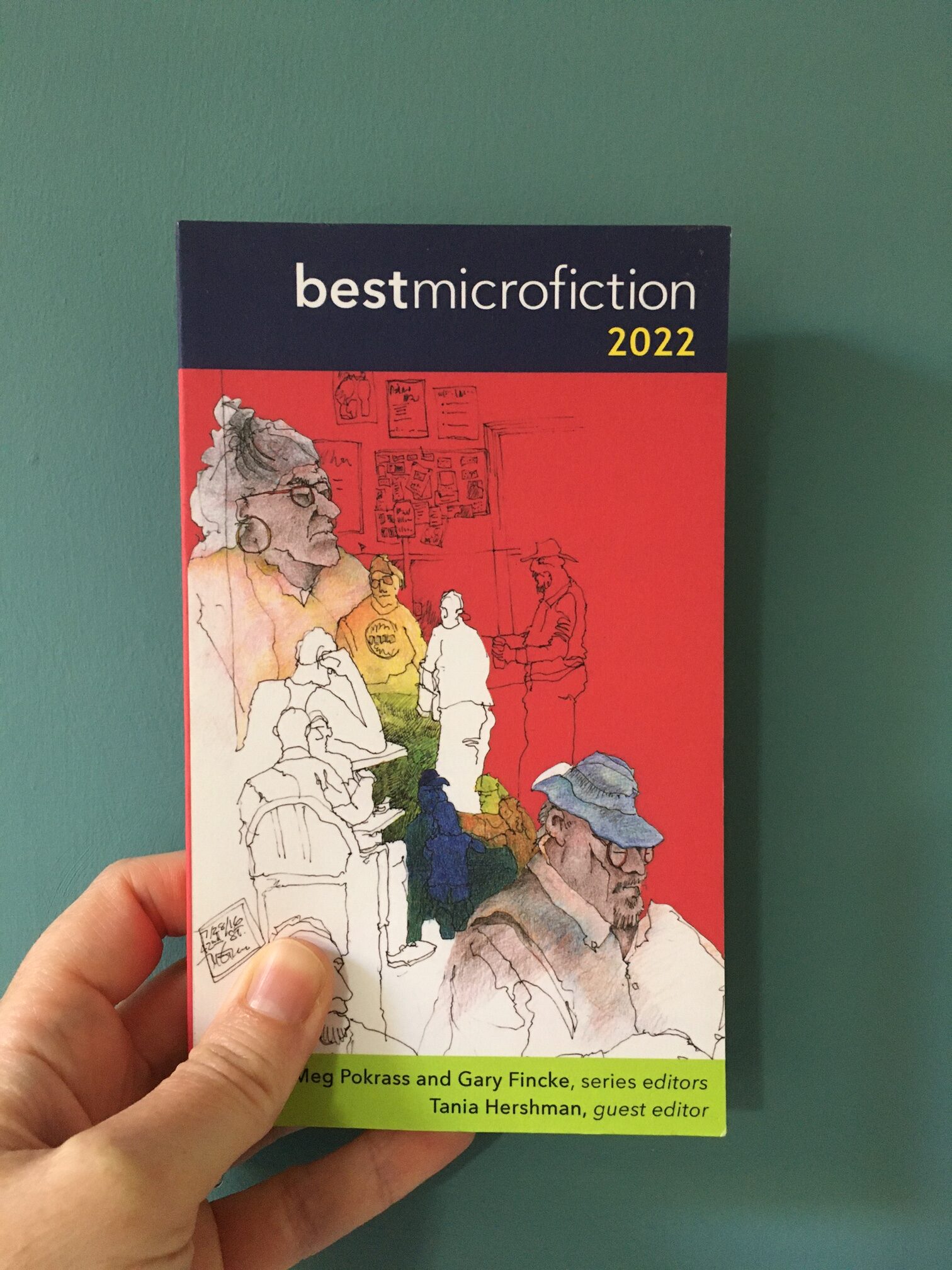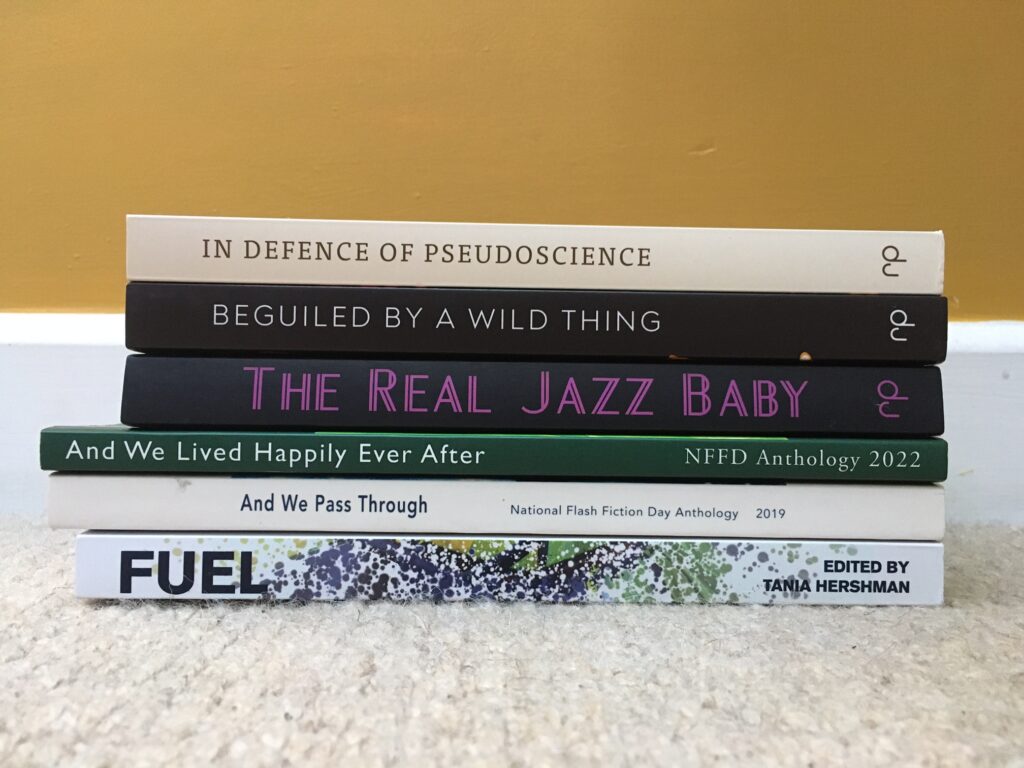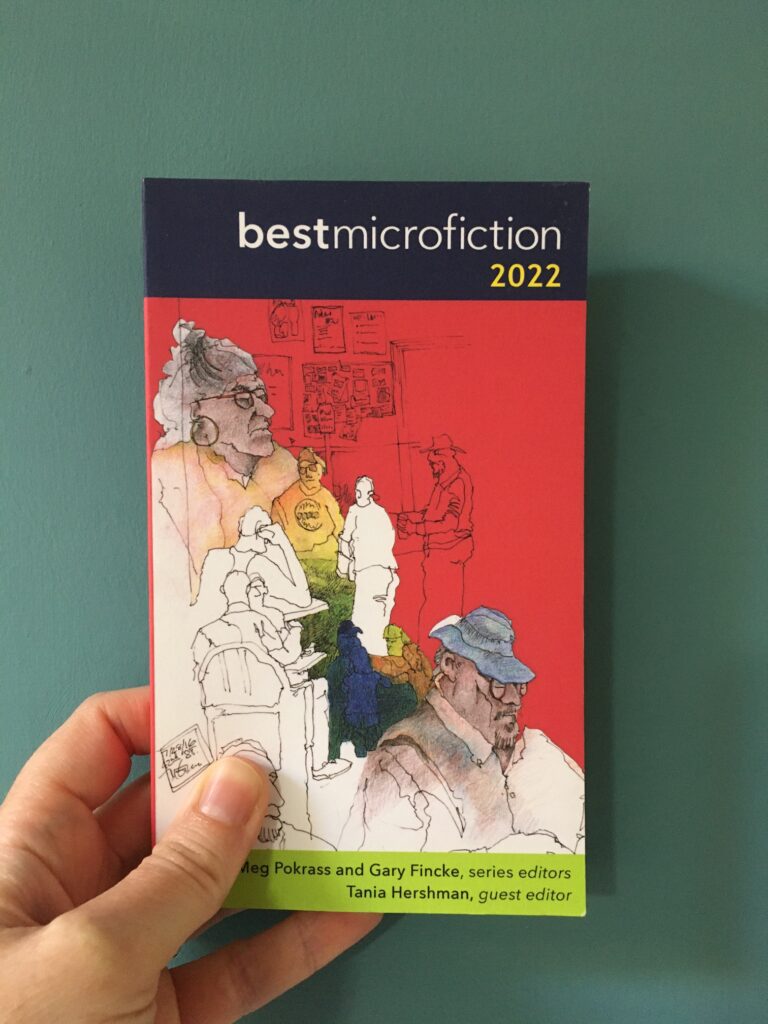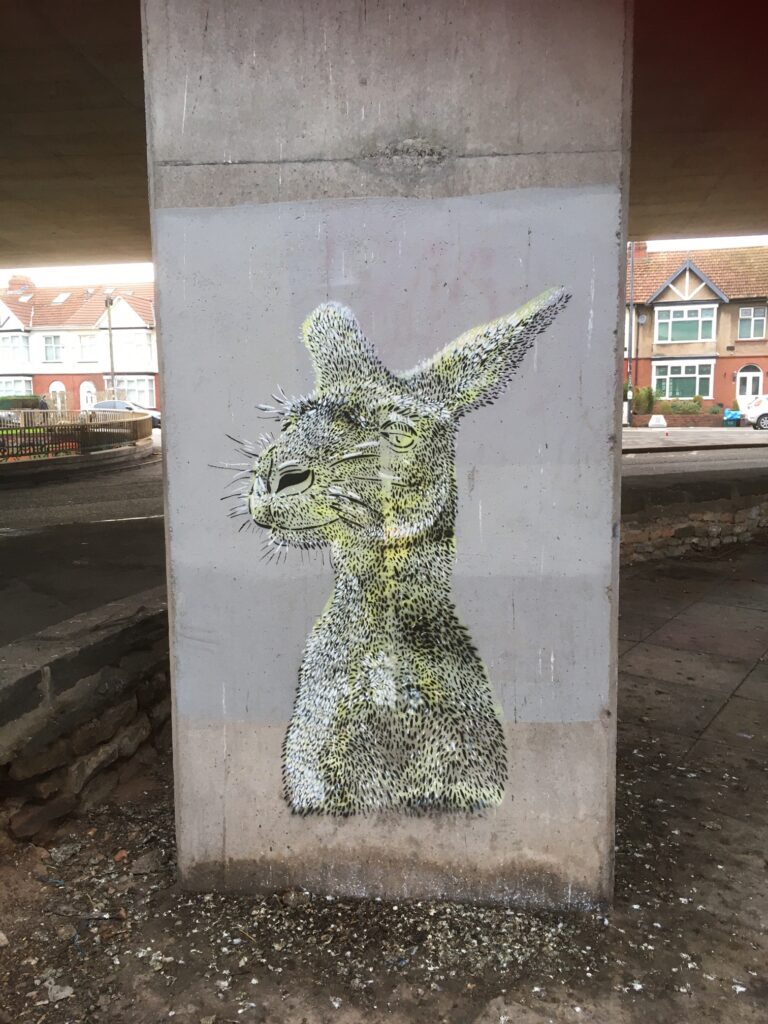
Part 2 MARK STATMAN: MEXICO AND THE POETRY OF GRIEF AND CELEBRATION
Part 2 of my interview with Mark Statman looks closely at Mark’s Latin American poetic influences, his life in Mexico and ends with an extract


I interviewed writer Lucy Goldring, whose flash-fictions have been shortlisted by Flash 500, Northern Gravy, Retreat West, National Flash Fiction Day (3x) as well as being longlisted for the Bath Flash Fiction Award and the Ellipsis Zine collection competition. In addition, Lucy’s writing has appeared in numerous magazines and anthologies. Lucy says she “… writes a lot about climate angst whilst trying not to get overwhelmed by her own” – but she also has a taste for comedy in all her work.
Leslie: Why do you specialise in short fictions and what’s the story of how that started and developed?
Lucy: I’ve wanted to be a writer since I was a kid and wrote some decent (heavily Roald Dahl influenced) stories in secondary school. I tried again after uni, taking various courses, but didn’t have much say. My jobs all involved writing, though – articles, reports, a few comedic pieces – so I ‘kept my hand in’, in a vague way.
At the age of 39, I started writing very short fiction for practical and mental health reasons. When my daughter was a baby, I was searching for something I could do with my free typing hand to stave off boredom and, I suppose, loneliness. I became aware of the National Flash Fiction Day, online mags like 100 Word Story and Ellipsis Zine, and competitions such as the recently closed Reflex Fiction. So began this tumultuous love affair – or weird gambling habit, depending on how I feel.
There I was, aged 40, dabbling in micros when I heard that the brilliant author, and professor of creative writing, Mimi Thebo would be running a free course at my son’s school. It turned out to be just the catalyst I needed, along with furnishing me with some craft essentials.
I’m a bit of a weird introvert-extrovert (a shy show-off, if you will) so perhaps I’ve always been seeking a way to get attention without people looking at me. There’s a stand-up comedienne in there somewhere but she’d have to perform from behind a curtain.
Leslie: What themes do you tackle in your writing – why them?
Lucy: With the exception of the climate/ecological emergency, I haven’t consciously pursued particular themes in my writing. I tend to write about relationship breakdown, parenting, ‘coming-of-age’ stuff and workplace ennui, to name a few.
More entertainingly (to me, at least) there are certain motifs in my stories that I’ve noticed in retrospect: faeces (both animal and human), underwear and tight men’s trousers, for example… no comment.
My draft ‘funny-sad’ collection, which was recently longlisted by Ellipsis Zine, pivots on the themes of loss, intimacy and resentment. Again, this was more a case of identifying connecting threads in my work rather than anything intentional.

For various reasons, I’ve tried to avoid becoming a ‘climate change writer’. I attempt to write about life; it just so happens that everything goes on against this mental and physical backdrop of the potential extinction of the human race. I’m bewildered (and yet not) by the casual way many informed people – including some writers – continue to choose a high carbon lifestyle, in spite of what we know. Cry at an Attenborough documentary… book your second long haul holiday flight in a year. Organise/go to a far-flung writing retreat…. at which you may consider how the issues of our time play into your work. I’m both alarmed and fascinated by the disconnect.
There’s a huge inequality element to this, of course; the people without choice or financial resources (abroad and at home) are not responsible for the climate emergency and yet they are disproportionately impacted by it.
One of the problems of raising these things is the inevitable hypocrisy. I’m a failed vegan who gets seduced by fast fashion more often than I’ll admit and still uses Amazon if I ‘need’ a particular product in a hurry (or it’s the only way to purchase a book). I fly to Jersey every few years to see my sister because I can’t cope with the puke-a-thon ferry experience. I no longer attend demos because I get overwhelmed and immediately dissolve into tears.
We need to discuss these things rather than shout each other into a corner. We’re animals after all, and a cornered animal has two options – fight or flight (no pun intended). It would be more constructive to channel our anger towards corporations and governments… but Step One might be as simple as switching banks and reducing your flights. After all, the world is on fire.
Leslie: Can you describe your personal process of writing short fiction, start to finish? What are the habits/rituals/chosen situations that help you to write?
Lucy: It varies piece to piece. Usually a competition prompt/theme will spark an idea or I’ll build a story around something I’ve noted down (see below). There’ve been a few instances of an idea arriving out of nowhere. Sometimes, I stare into space and try to get into a receptive mind-set. One of my best story ideas came like this after about fifteen minutes. I could tell immediately it had strong, muscly legs. I had to run to keep up.
If I feel stuck, I have to ‘creep up’ on myself. I pretend I’m going to do something else – ‘I’m just opening my laptop for no particular reason, la, la, la’ – and sometimes find myself writing.
Generally speaking, I like the initial ideas/free-write and later editing stages. I rarely enjoy the bit in the middle of wrestling ideas into a story. And, yes, I do sometimes dig out old un-homed stories and chop, change and combine them.
I note random thoughts and observations/dialogue on my phone. In the last few days, for instance, I’ve written ‘grout dwellers’ (saw some tiny weird bugs in my shower), ‘why does life always furnish us with the skills that would’ve been useful for the previous stage of life?’ and ‘a child who is the main source of joy in the family feels pressured by their role’.
Occasionally, I turn to Brian Eno and Peter Schmidt’s ‘Oblique Strategies’ cards for inspiration. (They’re actually my husband’s but let’s pretend I’m the cool one.)
If I’m really stuck, I go for not-strictly-necessary bus rides so I can earwig on fellow passengers on my way to get groceries. There’s always one weirdo on the bus and nowadays it’s usually me.
I also enjoy listening to interviews with established writers (while secretly hoping their brilliance will rub off on me).
Leslie: Can you give an example of the tone of voice you use in your short fictions? What bits are you, and what bits develop their own dynamic/persona?

Lucy: My favourite tone to write in his funny-sad or wry – sarcastic even. There’s a lot of me in that voice. My dubious sense of humour has been known to result in some pretty awkward social situations. Controversially, I’m going to suggest there’s a bit of a north-south divide with this. That’s my excuse anyway.
I’ve been told I do ‘angry’ well and there’s definitely some of me in that too. I’ve invented several bitter and twisted characters, which I can’t account for. Perhaps it’s a way to have a conversation with someone that I wouldn’t want to talk to in real life? I do try to give my less likable characters a saving grace or nudge them towards personal development.
In her workshop at the Flash Fiction Festival last year, Nancy Stohlman asked us to meditate on what our purpose as a writer is (which, I suppose, you could extend to include your whole life). My brain came up with ‘soothe and entertain’. Lots of people need soothing and entertaining. Sadness and fear can be just as parallelising as putting our hands over our eyes and ears. So, I am turning away from my doomier stuff and looking at different ways to engage, including on climate. Maybe I should extend my ‘mantra’? Soothe, entertain and catalyse, perhaps?
Leslie: What distinguishes the craft of writing micros, flash fiction and short stories – what’s the difference between these formats?
Lucy: I’m way off mastering this but I can confidently say what these formats have in common is that they have to tell a story. That’s what distinguishes flash fiction from, say, prose poetry.
The obvious difference between a micro, a flash and a short story is how much of the narrative is left off the page because of the word count. With micros, for example, the trick is to imply a whole world (protagonist/situation/setting etc) with a few well-chosen lines. When done well, it’s wonderfully engaging; the reader really has to draw on their own resources. You’re offering a peephole in a door and hoping the reader has the key to unlock the door and fling it open. Hopefully on the other side is something that thrills or delights them or has them smiling/crying in recognition. The very best micros stay with you, alter your perspective even. Some of my favourites don’t reveal whose story it is until the last sentence. Every so often, you get the full-body tingle experience at the end of a piece, as the words resettle into their discovered context. It’s the sophisticated, more elegant cousin of ‘the twist’ that you can’t stop thinking about.
The tricky issue is what you can get away with not saying. It’s easier to see when other writers achieve the balance but harder with your own writing. That’s where beta readers come in. I was lucky enough to persuade a few funny-sad authors, whose work I admire, to critique some of the stories in my collection. I can see now that the weakest stories are the ones I haven’t sought structured feedback on. My advice is get at least two people’s critiques. They are often wildly different. If something is reflected twice you should probably pay attention. Similarly, if you have the feeling that you’re trying to squeeze a short story into a flash or stretch a micro to the point where it falls apart, listen to that niggling inner voice.

Leslie: How is your climate-themed/speculative writing different to your other writing? Is this closer to ‘the real you’?
Lucy: Interesting. I have been around the climate change mitigation agenda for half my life. I’ve definitely written some climate-themed stories that are mainly for me – used writing as a way to process my frustration, terror and, more recently, grief. These pieces are more like creative nonfiction or autofiction so do feel close to the real me but not necessarily on a good day! I’m quite fun most of the time, honest.
Increasingly, I try to focus on writing a compelling story with the climate emergency as the backdrop. Writers are told early on not to preach on social issues, which links neatly to the more general advice of ‘show don’t tell’. Hopefully, now I’ve got some stuff off my chest, I’m in a better position to weave in social commentary more subtly. It feels good to sound off but it doesn’t usually translate to a great story – and, in my experience, it doesn’t change hearts and minds either.
Thinking further on ‘the real me’, I have a massive scriptwriting itch to scratch. I used to submit to Radio 4’s Newsjack and once got a comedy sketch recorded for the show that, much to my disappointment, didn’t make the final cut.
Last year, I got well into sitcom writing. I did a brilliant online course with Simon Wright through www.city-academy.com and produced a synopsis, a pilot and half an episode breakdown. Perhaps I’ll revisit it sometime. I was pretty happy with the characters. The craft advice, particularly around characterisation and emotional ‘movement’, was useful for my stories too. At the moment, I’m more interested in comedy drama, but it keeps changing. I love the idea of collaboration. Looking ahead, it would be extremely cool to co-write some climate emergency themed comedy.
Generally, a more DIY approach in 2024 would give my poor brain a break from the endless ‘submit – wait – process the rejection (/acceptance)’ cycle that I’m currently in. In many ways, it’s a very unhealthy way to live!
Meanwhile, I’ll be dusting off my homeless collection of short fictions and attempting to develop it. My current plan is to approach various small presses in the autumn. The stories are organised more or less chronologically by age of protagonist. There’s a lot of the real me in there – past, present and projected.
Next week Iinterview
ABOUT LESLIE TATE’S BOOKS

Part 2 of my interview with Mark Statman looks closely at Mark’s Latin American poetic influences, his life in Mexico and ends with an extract

I interviewed international poet and translator Mark Statman about Volverse/Volver, his 14th published collection. Mark, who has won national arts awards, is Emeritus Professor of Literary

I interviewed Lisa Dart, finalist in the Grolier, Aesthetica and Troubadour Poetry Prizes and author of The Linguistics of Light (poems, Salt, 2008), Fathom (prose

I interviewed writer Julia Lee Barclay-Morton about her experience of autism. Julia began as an experimental dramatist in New York, moving to the UK to

I interviewed Gillean McDougall from Glasgow, who edited the collaborative projects Honest Error (on Charles Rennie Mackintosh and his wife Margaret Macdonald) and Writing the
| Cookie | Duration | Description |
|---|---|---|
| cookielawinfo-checkbox-analytics | 11 months | This cookie is set by GDPR Cookie Consent plugin. The cookie is used to store the user consent for the cookies in the category "Analytics". |
| cookielawinfo-checkbox-functional | 11 months | The cookie is set by GDPR cookie consent to record the user consent for the cookies in the category "Functional". |
| cookielawinfo-checkbox-necessary | 11 months | This cookie is set by GDPR Cookie Consent plugin. The cookies is used to store the user consent for the cookies in the category "Necessary". |
| cookielawinfo-checkbox-others | 11 months | This cookie is set by GDPR Cookie Consent plugin. The cookie is used to store the user consent for the cookies in the category "Other. |
| cookielawinfo-checkbox-performance | 11 months | This cookie is set by GDPR Cookie Consent plugin. The cookie is used to store the user consent for the cookies in the category "Performance". |
| viewed_cookie_policy | 11 months | The cookie is set by the GDPR Cookie Consent plugin and is used to store whether or not user has consented to the use of cookies. It does not store any personal data. |